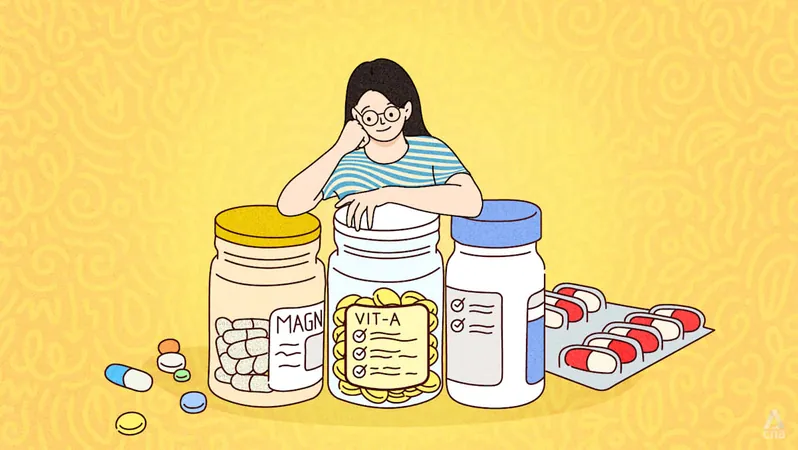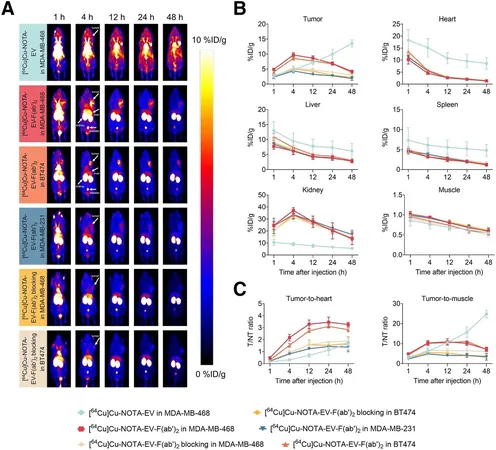
Unraveling the Truth: Do You Really Need Supplements for Energy, Glow, and Sleep?
2025-09-20
Author: Wei Ling
The Supplement Dilemma: Are They Essential?
Over a decade ago, I learned I had iron-deficiency anemia at a blood donation drive. The news stopped me in my tracks; my low hemoglobin levels meant I couldn’t donate blood, but it came with an unexpected prescription for iron supplements. Since then, I've been on and off these pills, taking them whenever fatigue hit or I needed a quick boost.
Concerned about over-relying on supplements, I tried to bridge nutritional gaps through my diet. However, a recent health scare which left me breathless and exhausted forced me back to the doctor—and low iron levels sent me on a quest for regular supplementation.
The Overwhelming World of Supplements
As I scoured the internet, I was bombarded with an endless sea of supplements claiming to provide energy, clearer skin, deeper sleep, and sharper focus. Peer pressure from friends approaching their 30s added to my confusion. I was left pondering: Are supplements truly necessary, or can a diet alone restore my health?
Experts Weigh In: Food First!
Nutritional experts generally agree that a well-planned, balanced diet can meet the nutritional needs for most healthy individuals. Dr. Kalpana Bhaskaran, president of the Singapore Nutrition and Dietetics Association, stresses that supplements should never replace food, as whole foods provide fiber, phytonutrients, and compounds that supplements simply can’t replicate.
Dr. Alvin Wong from Changi General Hospital underscores that while food should come first, supplements can be helpful to address specific deficiencies, especially as we age or face increased nutritional needs.
When Are Supplements Necessary?
Many adults face nutritional deficiencies, particularly older individuals who may struggle with absorption. Changes in the GI tract, starting as early as age 40, can affect appetite and digestion. Common deficiencies include vitamin D, calcium, and iron. Yet, even with these changes, Dr. Wong encourages focusing on nutrient-dense foods like dairy and fatty fish to meet needs.
Navigating Nutritional Gaps
Not all deficiencies can be rectified through diet alone. For mild iron-deficiency anemia, incorporating iron-rich foods alongside vitamin C can help, but severe cases may require supplements.
Experts warn against self-prescribing supplements for quick fixes. Reviewing diet and lifestyle should be the first step—addressing issues like poor nutrition, insufficient sleep, or stress before considering pills.
It’s All About Balance!
To maintain a nutritious diet and overall well-being, lifestyle changes like regular sun exposure for vitamin D and pairing iron-rich meals with vitamin C can significantly help. Consultation with a healthcare provider becomes crucial if symptoms persist.
Caution: Less Isn’t Always More!
Starting supplementation should be done judiciously, just like medications. Taking higher doses doesn’t guarantee better results and can lead to toxicity, especially with fat-soluble vitamins.
Making Informed Choices
If supplementation is needed, follow prescriptions, take vitamins with fats for better absorption, and be aware of interactions with other medications. For reliable products, look for transparency in manufacturing and third-party testing.
Beware of exaggerated claims—if it sounds too good to be true, it probably is. Cheap supplements may compromise quality.
The Bottom Line: Supplements as a Support!
Optimizing dietary quality is vital. The foundation of good health lies in a balanced diet of whole, minimally processed foods, adequate protein, moderate alcohol consumption, and regular physical activity. According to Dr. Wong, lifestyle changes yield far more significant benefits than any supplement ever could—positioning supplements as complementary aids rather than the cornerstone of good health.
In essence, prioritize a wholesome diet and smart lifestyle choices, keeping supplements as a supportive tool when necessary.



 Brasil (PT)
Brasil (PT)
 Canada (EN)
Canada (EN)
 Chile (ES)
Chile (ES)
 Česko (CS)
Česko (CS)
 대한민국 (KO)
대한민국 (KO)
 España (ES)
España (ES)
 France (FR)
France (FR)
 Hong Kong (EN)
Hong Kong (EN)
 Italia (IT)
Italia (IT)
 日本 (JA)
日本 (JA)
 Magyarország (HU)
Magyarország (HU)
 Norge (NO)
Norge (NO)
 Polska (PL)
Polska (PL)
 Schweiz (DE)
Schweiz (DE)
 Singapore (EN)
Singapore (EN)
 Sverige (SV)
Sverige (SV)
 Suomi (FI)
Suomi (FI)
 Türkiye (TR)
Türkiye (TR)
 الإمارات العربية المتحدة (AR)
الإمارات العربية المتحدة (AR)